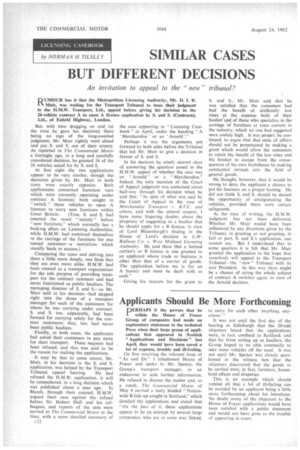SIMILAR CASES BUT DIFFERENT DECISIONS
Page 50

If you've noticed an error in this article please click here to report it so we can fix it.
An invitation to appeal to the "new" tribunal?
LICENSING CASEBOOK by NORMANTI.TILSLEY RIUMOUR has it that the Metropolitan Licensing Authority, Mr. D. I. R. Muir, was waiting for the Transport Tribunal to issue their judgment in the H.M.W. Transport, Ltd., appeal before giving his decision in the 26-vehicle contract A to open A licence application by S. and S. (Contracts), Ltd., of Enfield Highway, London.
But, with time dragging on and (at the time he gave his decision) there being no sign of the long-awaited judgment, Mr. Muir rightly went ahead and put S. and S. out of their misery. As reported in The Commercial Motor a fortnight ago, in a long and carefully considered decision, he granted 16 of the 26 vehicles asked for by S. and S.
At first sight the two applications appear to be very similar, though the decisions given by Mr. Muir in both cases were exactly opposite. Both applications concerned furniture vans which were currently operating under contract A licences; both sought to " switch " those vehicles to open A licences to carry new furniture within Great Britain. (True, S. and S. had inserted the word " mainly " before "new furniture," which normally has a braking effect on Licensing Authorities, while H.M.W. had restricted themselves to the carriage of the furniture for one named customer—a restriction which usually leads to success.) Comparing the cases and delving into them a little more deeply, one finds that they are even more alike. H.M.W. had been created as a transport organization for the sole purpose of providing transport for the contract customer and had never functioned as public hauliers. The managing director of S. and S,—as Mr. Muir said in his decision—had stepped right into the shoes of a transport manager for each of the customers for whom he was carrying under contract. S. and S. too, apparently, had been formed for carrying solely for the contract customers; they, too, had never been public hauliers.
Finally, in both cases, the applicants had asked their customers to pay more for their transport. These requests had been refused, and this was said to be the reason for making the applications.
It may be that to some extent, Mr. Muir, in his decision in the S. and S. application, was helped by the Transport Tribunal appeal hearing. He had refused the H.M.W. application, it will be remembered, in a long decision which was published about a year ago. in March, through their counsel, H.M.W. argued their case against the refusal before Sir Hubert Hull and his colleagues, and reports of the case were carried in The Commercial Motor at the time, with a more detailed summary of c22
the case appearing in "Licensing Casebook" in April, under the heading "A Merchandise or an Arnold '."
Perhaps it was the arguments put forward by both sides before the Tribunal that led Mr. Muir to give a decision in favour of S. and S.
In his decision he wisely steered clear of answering the question posed in the H.M.W. appeal of whether the case was an " Arnold " or a "Merchandise." Indeed, the only mention of the Court of Appeal judgment was contained about half-way through his decision when he said this: "In spite of what was said by the Court of Appeal in the case of Merchandise Transport v. RTC. and others, and with the utmost respect, I have some lingering doubts about the propriety of suggesting to a haulier that he should apply for a B licence, in view of Lord Blanesburgh's finding in the House of Lord's decision in G.W. Railway Co. v. West Midland Licensing Authority. He said there that a limited carrier's or B licence is one granted to an applicant whose trade or business is other than that of a carrier of goods. The application before me is for an A licence and must be dealt with as such."
Giving his reasons for the grant to
S. and S.,. Mr. Muir said that he was satisfied that the customers had had the benefit of artificially low rates at the expense both of their haulier-and of those who specialize in the carriage of furniture at rates current in the industry, which no one had suggested were unduly high. It was proper; he continued, to argue that that state of affairs should not be perpetuated by making a grant which would allow the customers to retain the benefit of the low rates and the haulier to escape from the consequences of his own foolishness by making substantial inroads into the field of general goods.
He thought, however, that it would be wrong to deny the applicant a chance to put his business on a proper footing. He did not think S. and S. should be denied the opportunity of amalgamating the vehicles, provided there were certain safeguards.
At the time of writing, the H.M.W. judgment has not been delivered. Whether Mr. Muir would have been influenced by any directions given by the Tribunal, in granting or not granting, in full or part, S. and S.'s application, one cannot say. But I understand that in some quarters it is felt that Mr. Muir granted the application in the hope that somebody will appeal to the Transport Tribunal—the " new " Tribunal with its new President. In this way there might be a chance of airing the whole subject of contract A switches again, in view of the Arnold decision.








































































































